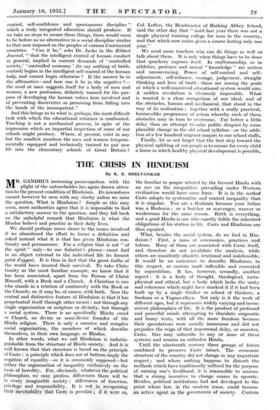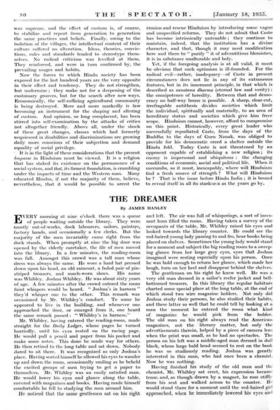THE CRISIS IN HINDUISM
By K. S. SHELVANKAR
MR. GANDHI'S increasing preoccupation with the plight of the untouchables has again drawn atten- tion to the present condition of Hinduism. Its inwardness cannot however be seen with any clarity unless we raise the question, What is Hinduism ? Simple as this may seem, most authorities agree that it is impossible to find a satisfactory answer to the question, and they fall back on the unhelpful remark that Hinduism is what the Hindus believe and practise in their daily lives.
We should perhaps move closer to the issues involved if we abandoned the effort to frame a definition and asked instead what it is that has given Hinduism con- tinuity and permanence. For a religion that is not " of the spirit " only—to use Sabatier's phrase—must find in an object external to the individual life its firmest point d'appui. It is thus in fact that the great faiths of the world have insured their survival. To take Chris- tianity as the most familiar example, we know that it has been associated, apart from the Person of Christ Himself, with a Book and a Church. A Christian is one who stands in a relation of conformity with the Book or the Church; or, it may be, of course, with both. Now the central and distinctive feature of Hinduism is that it has perpetuated itself through other means : not through any single organization or scripture or divinity, but through a social system. There is no specifically Hindu creed or Church, no divine or semi-divine founder of the Hindu religioxi. There is only a massive and complex social organization, the members of which describe themselves, in their own language, as Hindus.
In other words, what we call Hinduism is indistin- guishable from the structure of Hindu society. And it is well known that that structure is based on the principle of Caste : a principle which does not at bottom imply the negation of equality—as it is commonly supposed—but rather the organization of inequality exclusively on the basis of heredity. For, obviously, whatever the political philosophies we may profess, differences there will be in every imaginable society : differences of function, privilege and responsibility. It is not ins recognizing their inevitability that Caste is peculiar ; if it were so, the familiar to quoque uttered by the fervent Hindu with an eye on the inequalities prevailing under Western civilization would have sonic force. It is in the method Caste adopts to systematize and control inequality that it is singular. You are a Brahmin because your father was a Brahmin ; or a butcher or scavenger, weaver or washerman for the same reason. Birth is everything, and a goad Hindu is one who exactly fulfils the inherited obligations of his station in life. Caste and Hinduism are thus equated.
What, besides the social system, do we find in Hin- duism ? First, a mass of ceremonies, practices and taboos. Many of them are associated with Caste itself, and therefore do not invalidate the analysis, while others are manifestly obsolete, irrational and indefensible. It would be no caricature to describe Hinduism, in this respect, as custom made inflexible and cemented by superstition. It has, however, secondly, another aspect : it is a body of thought, theological, meta- physical and ethical, but a body which lacks the unity and coherence which might have Marked it if it had been built up by a single thinker or school of thinkers, a Sankara or a Yagnavalkya. Not only is it the work of different ages, but it represents widely varying and incon- sistent philosophies of life. It is the product of profound and powerful minds attempting to elucidate enigmatic and hoary texts, with all the more freedom because their speculations were socially innocuous and did not prejudice the reign of that impersonal deity, or monster, Caste. One may subscribe to any or none of these systems and remain an orthodox Hindu.
Until the nineteenth century three groups of forces combined to preserve Caste intact. The economic structure of the country did not change in any important respect ; and where nothing happens to disturb the methods which have traditionally sufficed for the purpose of earning one's livelihood, it is reasonable to assume that a strong incentive to change ceases to operate. Besides, political institutions had not developed to the point where law, in the modern sense, could become an active agent in the governance of society. Custom was supreme, and the effect of custom is, of course, to stabilize and repeat from generation to generation. the same practices and beliefs. Finally, owing to the isolation of the villages, the intellectual content of their culture suffered no alteration. Ideas, theories, convic- tions, rules and standards tended to stereotype them- selves. No radical criticism was levelled at them. They reinforced, and were in turn confirmed by, the prevailing usages and habits.
Now the forces to which Hindu society has been exposed for the last hundred years are the very opposite in their effect and tendency. They do not strengthen, but undermine ; they make not for a deepening of the customary grooves, but for the search after new ways. Economically, the self-sufficing agricultural community is being destroyed. More and more markedly is law becoming an instrument for the shaping and altering of custom. And opinion, so long complacent, has been stirred into self-examination by the attacks of critics not altogether friendly. Above all, under the shock of these great changes, classes which had formerly acquiesced in disabilities and discriminations are growing daily more conscious of their subjection and demand equality of social privilege.
- It is in the light of these considerations that the present impasse in Hinduism must be viewed. It is a religion that has staked its existence on the permanence of a social system, and that, its firmest foundation, is crumbling under the impacts of time and the Western man. Many educated Hindus, if not the majority of them, believe, nevertheless, that it would be possible to arrest the erosion and rescue Hinduism by introducing some vague and unspecified reforms. They do not admit that Caste has become intrinsically untenable ; they continue to maintain; indeed, that the institution has a divine character, and that, though it may need modification here and there to " purify " it of adventitious blemishes, it is in substance unalterable and holy.
Yet, if the foregoing analysis is at all valid, it must be obvious that such optimism is ill-founded. For the radical evil—rather, inadequacy—of Caste in present Circumstances does not lie in any of its extraneous features, but in its innermost principle, in that which is described as sanatana dharma (eternal law and verity) : the omnipotence of heredity. Between that and demo- cracy no half-way house is possible. - A sharp, elear-eut, irrefragable antithesis divides societies which limit the individual, spiritually and materially, to an area of hereditary status and societies which give • him freer scope. Hinduism cannot, however, afford to compromise on this point. Historically, every great leader who successfully repudiated Caste, from the days of the Buddha to the days of Guru Nanak, was obliged to provide for his democratic creed a shelter outside the Hindu fold. Today Caste is not threatened by an opponent capable of establishing a new religion ; its enemy is impersonal and ubiquitous : the changing conditions of economic, social and political life. When it succumbs, as it must, inescapably, where will Hinduism find a fresh source of strength ? What will Hinduism be ? That is the issue before Hindu India ; it is bound to reveal itself in all its starkness as the years go by.







































 Previous page
Previous page